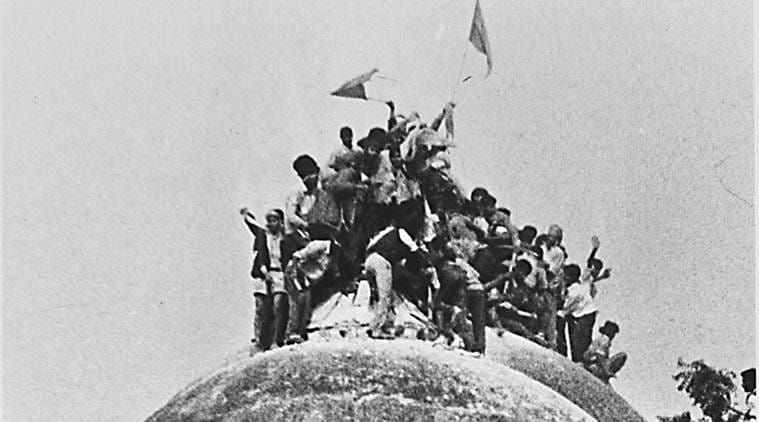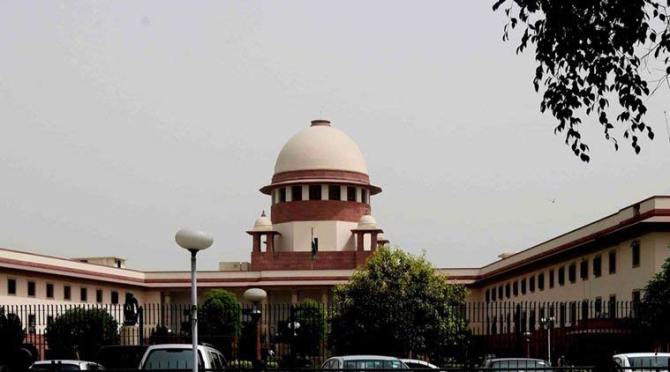 Ayodhya-linked verdict in Supreme Court: The apex court refused to refer to larger bench issue whether mosques are integral to Islam
Ayodhya-linked verdict in Supreme Court: The apex court refused to refer to larger bench issue whether mosques are integral to Islam
The Supreme Court Thursday, in a 2:1 majority verdict, ruled that the 1994 Ismail Faruqui case – that mosques are not integral to Islam – will not be referred to a larger bench, clearing the way for the apex court to hear the main Ayodhya title suit. The majority verdict was pronounced by Justice Ashok Bhushan, who read on his and Chief Justice of India Dipak Misra’s behalf. Justice S Abdul Nazeer presented a dissenting judgment.
The statement in Faruqui case was in the limited context of immunity claimed by the petitioners for the mosque from acquisition, Justice Bhushan said, adding that “it need not be read broadly to mean mosque can never be essential to practise of Islam”.
“The present case shall be decided on its own facts, the Ismail Farooqui judgment would have no impact on it,” Justice Bhushan added.
Justice Nazeer, in his judgment, said “questionable observations” in Faruqui ruling were “arrived at without undertaking comprehensive examination” and ‘have permeated” the judgement in the main Ayodhya title suit. He further stated that it needs to be brought in line with the Shirur mutt case. The next hearing has been slated for October 29.
Muslim organisations had argued before the special bench that the “sweeping” observation of the apex court in the 1994 verdict needed to be reconsidered by a five-judge bench as “it had and will have a bearing” on the Babri Masjid-Ram Temple land dispute case.
Senior advocate Rajeev Dhavan, appearing for legal representative of petitioner M Siddiq, had said that the observation that mosques were not essential for practising Islam were made by the apex court without any enquiry or considering the religious texts. The Uttar Pradesh government had earlier told the top court that some Muslim groups were trying to delay the hearing in the “long-pending” Ayodhya temple-mosque land dispute case by seeking reconsideration of the observation in the 1994 verdict that a mosque was not integral to Islam.


 Ayodhya-linked verdict: Supreme Court will decide whether the 1994 judgment should be referred to a larger bench
Ayodhya-linked verdict: Supreme Court will decide whether the 1994 judgment should be referred to a larger bench

While disagreeing with the two judges, Justice Nazeer says that whether the mosque is integral to Islam has to be decided considering belief of religion and it requires detailed consideration. He also refers to the recent Supreme Court order on female genital mutilation and said the present matter be heard by a larger bench.
Three judge Bench of Supreme Court will decide the title dispute. No reference to larger Bench, Supreme Court holds by 2:1 majority.
Justice Nazeer disagrees with the majority decision. Says it should have been referred to a larger bench. Earlier Justice Ashok Bhushan on behalf of CJI Dipak Misra said observations in Ismail Faruqui judgment on mosques as not essential to religion is in the context of the acquisition of mosque and made with respect to the facts of that case.
The Supreme Court will begin hearing Ayodhya matter from October 29, 2018 to decide the suit on merit
Justice Nazeer says “questionable observations” in Faruqui ruling “arrived at without undertaking comprehensive examination” and “have permeated” the judgement in the main Ayodhya title suit.
Observations in Ismail Faruqui judgment on mosques as not essential to religion is in the context of the acquisition of mosque and made with respect to the facts of that case, says Justice Ashok Bhushan. The statement in Faruqui case was in the limited context of immunity claimed by the petitioners for the mosque from acquisition, it need not be read broadly to mean mosque can never be essential to practise of Islam, he adds.
Justice Ashok Bhushan is pronouncing the verdict on behalf of CJI Dipak Misra and himself.
Justices Bharucha and Ahmadi found that the “Act and the Reference… favour one religious community and disfavour another”; therefore “the purpose of the Reference is… opposed to secularism and is unconstitutional”. Also, the judges said, “the Reference does not serve a constitutional purpose.”
The minority judgment struck down the 1993 Act “as being unconstitutional”, and returned the Presidential Reference without answering. “When… adherents of the religion of the majority of Indian citizens make a claim upon and assail the place of worship of another religion and, by dint of numbers, create conditions that are conducive to public disorder, it is the constitutional obligation of the State to protect that place of worship and to preserve public order… It is impermissible under the provisions of the Constitution for the State to acquire that place of worship to preserve public order. To condone the acquisition of a place of worship in such circumstances is to efface the principle of secularism from the Constitution,” the minority judgment said.
BJP leader Subramanian Swamy had in July appealed seeking enforcement of his fundamental right to worship at the disputed Ram temple at Ayodhya. But the bench comprising Chief Justice Dipak Misra and Justices A M Khanwilkar and D Y Chandrachud asked him to mention it 'later on'.
Swamy said the term “later on” was very subjective and added that he would mention his plea for hearing after 15 days again.
A five-judge Constitution Bench, headed by then CJI M N Venkatchalliah, had in 1994 held, “under the Mohammedan Law applicable in India, title to a mosque can be lost by adverse possession…. If that is the position in law, there can be no reason to hold that a mosque has a unique or special status, higher than that of the places of worship of other religions in secular India to make it immune from acquisition by exercise of the sovereign or prerogative power of the State. A mosque is not an essential part of the practice of the religion of Islam and namaz (prayer) by Muslims can be offered anywhere, even in open.”
The 24-year-old judgement by Supreme Court in Ismail Faruqi vs Union of India has become the crucial clog in the Ram Mandir-Babri Masjid dispute as it considered the question of acquisition of religious place by the State.
The Lucknow bench of the Allahabad High Court had in 2010 ruled a three-way division of the disputed 2.77 acres area at the Ram Janambhoomi-Babri Masjid site in Ayodhya. The three-judge bench of the high court, by a 2:1 majority, had said the land be partitioned equally among three parties — the Sunni Waqf Board, the Nirmohi Akhara and Ram Lalla.
A three-judge bench headed by Chief Justice of India Dipak Misra will decide whether the 1994 Ismail Faruqui judgment should be referred to a larger bench and if it involves constitutional questions. Earlier in July, the Supreme Court had reserved its order. It was argued by Muslim groups before a special bench comprising Chief Justice Dipak Misra and justices Ashok Bhushan and S A Nazeer that the “sweeping” observation of the apex court in the verdict needed to be reconsidered by a five-judge bench as “it had and will have a bearing” on the Babri Masjid-Ram Temple land dispute case.